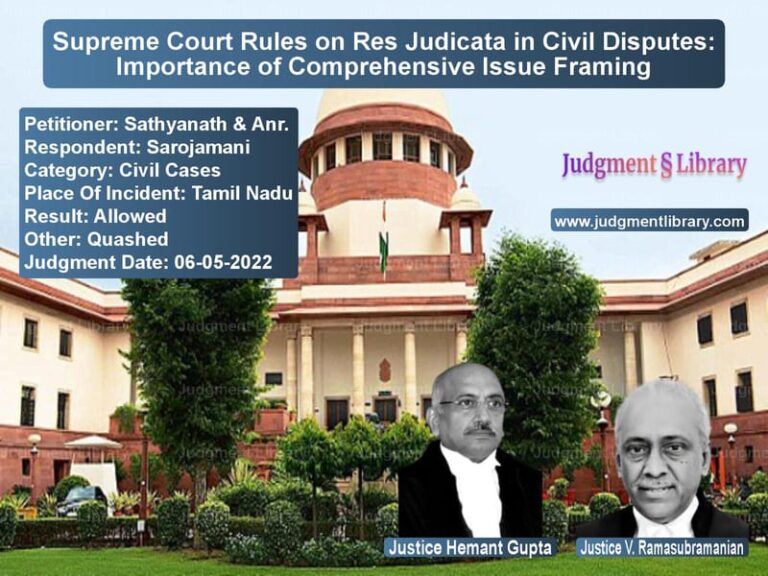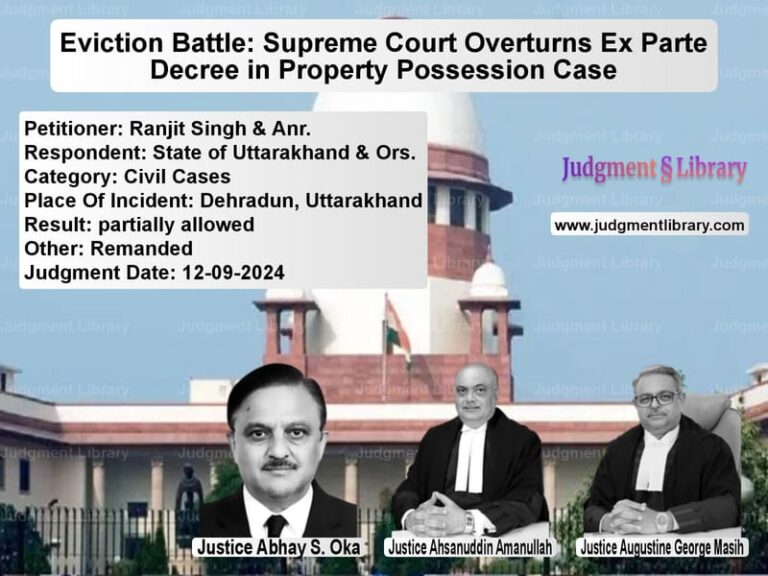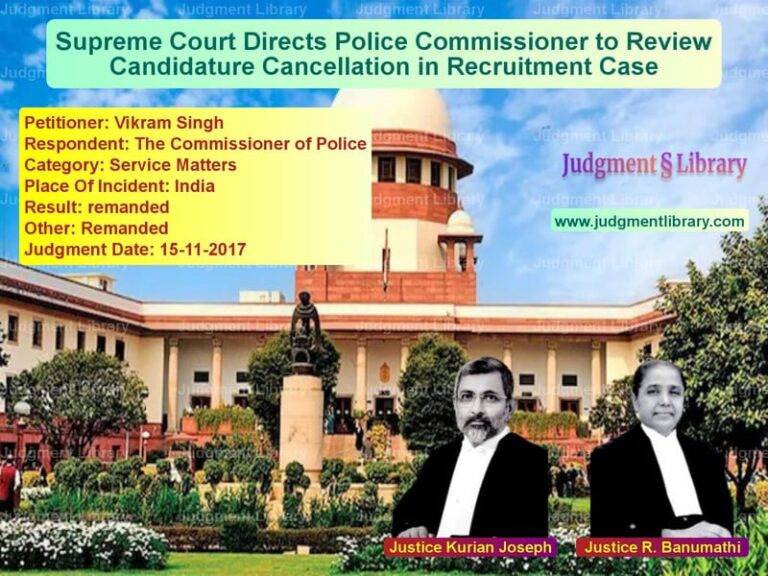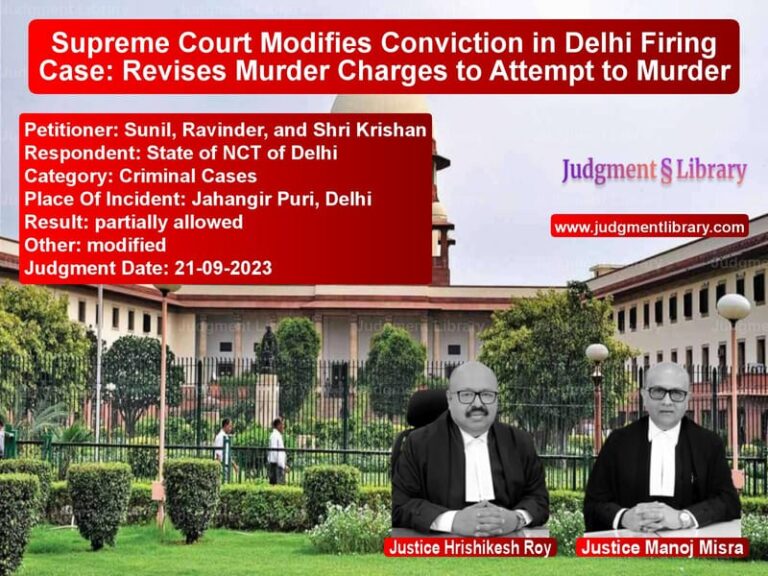Supreme Court Acquits Man in Murder Case: Key Takeaways on Circumstantial Evidence
The Supreme Court of India recently delivered a crucial judgment in the case of Indrajit Das vs. State of Tripura, wherein the appellant was acquitted of charges under Section 302 (murder) and Section 201 (causing disappearance of evidence) of the Indian Penal Code (IPC). The Court ruled that the prosecution failed to establish a complete chain of circumstantial evidence beyond a reasonable doubt, leading to the acquittal of the accused.
Background of the Case
The case revolves around the alleged murder of Kaushik Sarkar, who was reported missing after leaving his house with the appellant, Indrajit Das, and a co-accused juvenile. The prosecution claimed that the accused had killed Kaushik and disposed of his body in a river. However, the Supreme Court found multiple lapses in the prosecution’s case, ultimately granting the appellant the benefit of doubt.
Read also: https://judgmentlibrary.com/supreme-court-denies-cbi-probe-in-ndps-case-a-detailed-analysis/
Petitioners’ Arguments
- The prosecution alleged that the accused and a juvenile co-accused murdered Kaushik Sarkar using a sharp weapon (vojali) and dumped his body in a river.
- They relied on circumstantial evidence, claiming that the deceased was last seen with the accused.
- The prosecution presented evidence of bloodstains, the accused’s extra-judicial confession, and witness testimonies to establish guilt.
Respondents’ Arguments
- The defense contended that the prosecution failed to provide direct evidence linking the appellant to the crime.
- They argued that the case was based entirely on circumstantial evidence, which did not form a complete and unbroken chain leading to guilt.
- The appellant denied making any extra-judicial confession, claiming that it was coerced and lacked independent corroboration.
Key Observations by the Supreme Court
The Supreme Court carefully examined the prosecution’s case and made several significant observations:
- Lack of Motive: The prosecution failed to establish a clear motive for the crime, which is a critical element in cases based on circumstantial evidence.
- No Direct Evidence: The case was based entirely on circumstantial evidence, with no eyewitnesses or direct proof of the crime.
- Last Seen Theory Inconsistent: The claim that the deceased was last seen with the accused was not sufficiently corroborated.
- Absence of Corpus Delicti: The body of the deceased was never recovered, making it difficult to prove conclusively that a murder had taken place.
- Weak Extra-Judicial Confession: The alleged confession by the appellant was retracted and lacked independent supporting evidence.
- Incomplete Chain of Circumstances: The Court emphasized that in cases of circumstantial evidence, every link in the chain must be proven beyond doubt. In this case, significant gaps remained.
Judgment
Based on the above findings, the Supreme Court ruled:
- The appellant was granted the benefit of doubt due to inconsistencies in the prosecution’s case.
- The High Court’s decision to uphold the conviction was overturned.
- The accused was acquitted and ordered to be released immediately.
Implications of the Judgment
This ruling sets an important precedent regarding circumstantial evidence in criminal trials:
- Emphasizing the Burden of Proof: The judgment reinforces that in criminal cases, the prosecution must prove guilt beyond a reasonable doubt.
- Reaffirming the Importance of Motive: The absence of a clear motive weakens a circumstantial evidence case.
- Strengthening Protections Against Wrongful Convictions: The ruling ensures that individuals are not convicted based on weak or incomplete evidence.
- Preventing Over-Reliance on Extra-Judicial Confessions: The judgment cautions against accepting confessions without corroborating evidence.
Conclusion
The Supreme Court’s ruling in this case highlights the significance of a complete and unbroken chain of circumstantial evidence in securing convictions. By acquitting the accused, the Court reinforced the fundamental principle that no person should be punished unless their guilt is proven beyond reasonable doubt. This judgment serves as a critical reminder of the legal protections available to the accused and the high standard of proof required in criminal trials.
Read also: https://judgmentlibrary.com/supreme-court-ruling-on-dowry-death-case-understanding-section-319-crpc/
Petitioner Name: Indrajit Das.Respondent Name: State of Tripura.Judgment By: Justice B.R. Gavai, Justice Vikram Nath.Place Of Incident: Tripura, India.Judgment Date: 28-02-2023.
Don’t miss out on the full details! Download the complete judgment in PDF format below and gain valuable insights instantly!
Download Judgment: indrajit-das-vs-state-of-tripura-supreme-court-of-india-judgment-dated-28-02-2023.pdf
Directly Download Judgment: Directly download this Judgment
See all petitions in Murder Cases
See all petitions in Bail and Anticipatory Bail
See all petitions in Fraud and Forgery
See all petitions in Custodial Deaths and Police Misconduct
See all petitions in Attempt to Murder Cases
See all petitions in Judgment by B R Gavai
See all petitions in Judgment by Vikram Nath
See all petitions in allowed
See all petitions in Quashed
See all petitions in supreme court of India judgments February 2023
See all petitions in 2023 judgments
See all posts in Criminal Cases Category
See all allowed petitions in Criminal Cases Category
See all Dismissed petitions in Criminal Cases Category
See all partially allowed petitions in Criminal Cases Category







